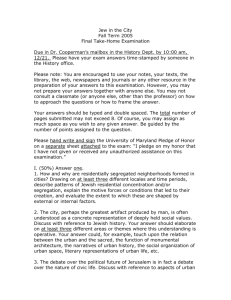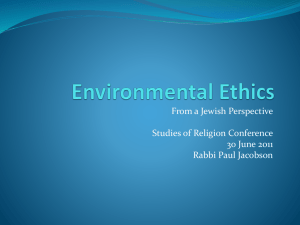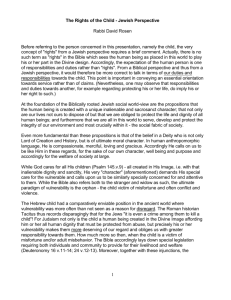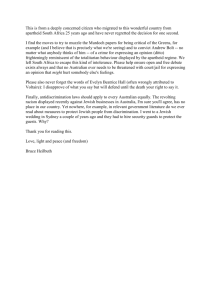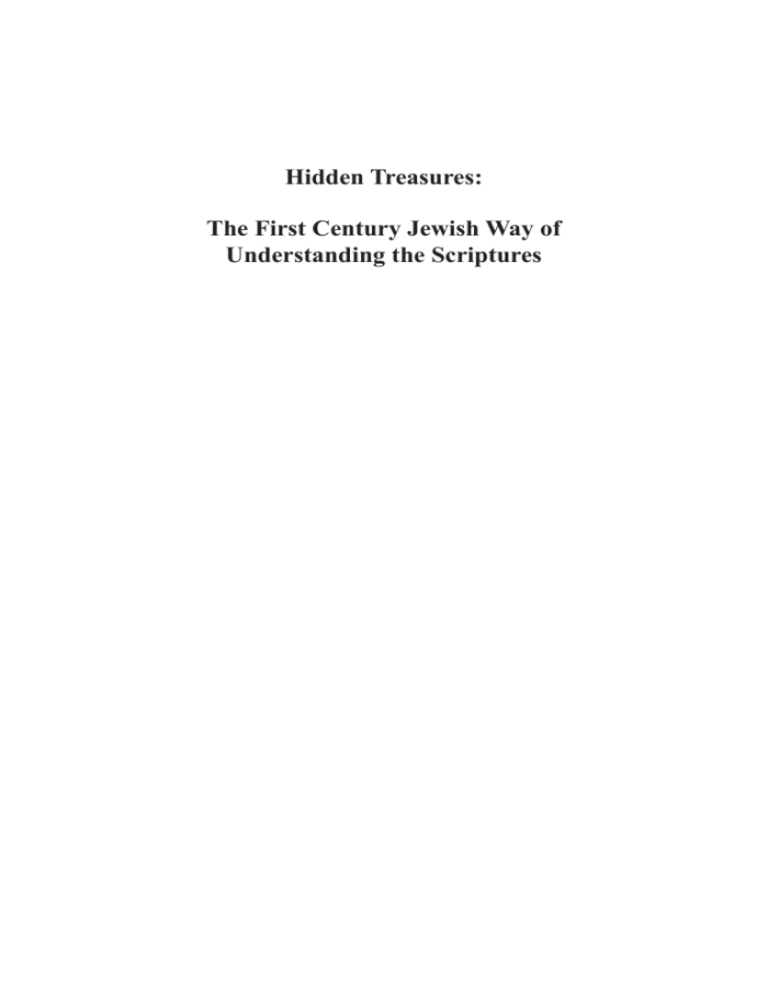
Hidden Treasures:
The First Century Jewish Way of
Understanding the Scriptures
Hidden Treasures:
The First Century Jewish Way of
Understanding the Scriptures
Joseph Shulam
Netivyah Bible Instruction Ministry
Jerusalem, Israel
2008
Netivyah Bible Instruction Ministry
NETIVYAH
P.O. Box 8043
Jerusalem, 91080
ISRAEL
NETIVYAH U.S.A.
P.O. Box 1387
Mt. Juliet, TN 37121
U.S.A.
netivyah@netivyah.org.il
www.netivyah.org
ISBN (978-0-9818730-0-8)
Hidden Treasures: The First Century Jewish Way
of Understanding the Scriptures, by Joseph Shulam
Editors: Elizabeth Wakefield, Rittie Katz
©2008 Netivyah Bible Instruction Ministry. All rights reserved.
This book may not be reproduced, in whole or in part, in any form
(beyond that permitted by copyright law) without the original
publisher’s permission.
Printed in Israel
I dedicate this book to Marcia my wife of forty years.
Marcia is the woman by my side and my inspiration!
Joseph Shulam
Contents
Introduction ........................................................................... 9
The Writer’s Forward ........................................................... 11
Part One:
Jewish Interpretive Methods for Sacred Texts
Chapter 1: An Introduction to Hermeneutics ....................... 17
Chapter 2: The Major Jewish Rules of Interpretation
of Scripture in the First Century ........................ 48
Chapter 3: Hekkesh.............................................................. 65
Part Two:
Contemporary Challenges for Messianic Judaism
Chapter 4: Messianic Jewish Hermeneutics ........................ 74
Chapter 5: The Matter of Mitzvot........................................ 86
Chapter 6: Messianic Jewish Halacha................................. 97
Chapter 7: The Principles of Jewish Education ................. 107
Appendix: The 13 Principles of Rabbi Ishmael ................. 127
Selected Bibliography ........................................................ 130
Introduction
Netivyah Bible Instruction Ministry is located in the center
of Jerusalem. A cursory look at the city today may give one
the correct impression of a thriving cosmopolitan metropolis,
complete with red tile roofed houses and the requisite cell phone
for each person. To look at Jerusalem only today, however,
would be to miss the layer upon layer of civilization, conflict,
hope, dreams, loss, aspirations, and prayers that have been
part of the life of the City from the beginning. Jerusalem was
captured by King David and made the political and religious
capital of the Jewish people. Jerusalem is the home of the First
Temple built by King Solomon, as well as the Second Temple.
Jerusalem has been destroyed by civil wars, conquered by the
Babylonians, Romans, Crusaders, Muslims, British, and many
others. It was divided in l948 at the inception of the modern
State of Israel and re-united in l967. Jerusalem is now a vibrant
and pulsating metropolis. It is the home of three major world
religions and the stage on which the Lord Yeshua has changed
and will continue to change history. No city the whole world
over is more beautiful or more steeped in controversy than
Jerusalem. To ignore the historical, religious, cultural, and
prophetic implications of Jerusalem is to miss the heart and
the essence of the history of salvation.
Similarly, to read the Bible and content ourselves with
only the traditional Christian theological understanding is to
perhaps miss the root and essence of God’s revelation in the
Scriptures themselves. The traditional way that Christians have
understood the Bible has brought division and sectarianism into
the world. In this book, Joseph Shulam gives the reader tools
with which to dig deeply into the First Century background
9
of the Scriptures. This book will enable the reader to piece
together the hidden layers and meaning contained within the
sacred texts.
This book is divided into two parts. The first section gives
a basic introduction to the subjects of hermeneutics and Biblical
interpretation, and explains how Jewish interpretation helps
us better understand the New Testament text. The book has
chapters explaining the exegetical principles of Rabbi Hillel,
a famous First Century Rabbi who was the president of the
Sanhedrin. It also explains the concept of midrash and the four
Rabbinic levels of interpretation. This volume will provide
the reader with useful tools for personal study, academic
endeavors, and Biblical exegesis. The reader will find many
examples of how the New Testament authors used traditional
Jewish exegetical methods to construct their arguments from
the Torah, the Prophets, and the Psalms.
The second section contains articles on important
contemporary issues for disciples of Yeshua. Some of these
topics include how we can restore a uniquely Messianic
hermeneutic. Many problems that beset Christian theologians
can find their solution by seeing the New Testament as a
Jewish book. The problem of balancing observance of God’s
commandments with the grace we have in Yeshua the Messiah
can be resolved by reading Paul’s letters in the context of his
Jewish Rabbinic background. Finally, there is a chapter on the
importance of continuous education in Jewish life.
The title of this book comes from Isaiah 45:3, which
says, “And I will give you the treasures of darkness and hidden
riches of secret places that you may know that I, the Lord, who
calls you by name, am the God of Israel.”
May you be enriched and strengthened as you embark on
this journey of discovery.
-The Editors
10
The Writer’s Forward
The Bible is a collection of ancient literature. It was written
over a period of a thousand years and by many different writers
under many different circumstances. Naturally, if such an
ancient document fell into the hands of any modern reader, he
would find it difficult to decipher, read, or understand. In order
to be able to understand the Bible, the science of hermeneutics
developed both in Christianity and in Judaism. The New
Testament was written almost exclusively by Jews in a Jewish
Historical context, and it reflects the ideas and the concepts of
the Jewish people during the First Century after Yeshua.
This book, although small in volume, is a collection of
articles which I hope will enable you to take a significant step
in furthering your understanding of the Bible and give you
tools to better understand the Word of God as it was intended
to be understood by the writers themselves.
In a sense, these eight chapters are a synthesis of teachings
and lectures given in lay circles over the last few years. Rabbi
Paul states in 2 Timothy 2:15, we must rightly divide the
word of truth. What does this mean? If I put Paul’s statement
to “rightly divide the Word of Truth” into simple terms, it
means to read the Word of God without making a salad out
of it. It means that we ought to discern the difference between
poetry and narratives in the Bible. It means that we ought to
put things into their historical setting the best we can before
we produce doctrines that divide the body of believers based
on uneducated opinions. It means that we ought to divide
between things that are eternal and things that are ad-hoc and
only for a specific occasion.
11
The Apostle Paul states in the New Testament: “What
advantage, then, is there in being a Jew, or what value is there
in circumcision? Much in every way! First of all, they have
been entrusted with the very words of God.” (Romans 3:1-2) I
believe that appreciating the way in which Jewish people have
related to and interpreted the Bible, as well as the cultural
and historical context in which it was written, will enhance
your awareness of the methods that were used by the writers
of the Scriptures.
Many of us have literally staked our lives on what is written
in the Bible. Especially in Israel, we have been marginalized,
rejected, persecuted, and maligned. It is, therefore, incumbent
upon us to truly understand the precepts within the Scriptures,
and in the event that we are asked, to give an answer for the
hope that is within us.
Rabbi Paul studied under the great teacher Gamliel who
was the grandson of Hillel. The first principles of hermeneutics
(Biblical interpretation) in Judaism contained in this book
were codified by Rabbi Hillel. The rules of interpretation that
were used by the New Testament writers are those same rules
that were used by all the Jewish interpreters of the Torah and
the Prophets. For this very reason, we ought to make a special
effort to understand these rules and use them in order to better
comprehend God’s Word.
The attitude of the Rabbis toward the Torah (Law of
Moses) and the commandments seems to always be in question
by Christians and Jews. As a part of this “forward,” I would
like to introduce to you an interesting midrash that will bring
you into the world of the Rabbis and demonstrate the spirit
of the Torah and a certain unique way of dealing with the
Scriptures.
12
The Lord was wondering how He could know which of
His servants serve Him out of fear and which of them serve
Him out of love. He devised a method that would discover
this knowledge. He built a room four by four, a four-square
room with only one small peep hole of four by four spans.
The Lord put all His servants into this room. Those servants
who served Him out of fear stood in that “four by four” room
and said: “If the Lord had wanted us to break out of this room
He would not have built it and put us into it.” The servants
who loved the Lord said, “We want to break out of this room
and join the Lord in the outside in the wide open spaces.”
However the little peep hole was too small, and they had to
make themselves suffer and lose much weight to be able to fit
through the small peep hole in the door and join the Lord in
the wide open spaces. They loved the Lord so much that they
could not stay closed in the “four by four” room even knowing
that the Lord had built it and placed them there.I They wanted
to “break out” by force and violence from the “four by four”
room and join the Lord who was sitting on His throne in the
wide open spaces.
This midrash is very interesting in many ways. The first
important truth from this midrash is that it is based on the
text of Micah 2:12-13, “I will surely assemble all of you, O
Jacob, I will surely gather the remnant of Israel; I will put
them together like sheep of the fold, like a flock in the midst
of their pasture. They shall make a loud noise because of so
many people. The one who breaks open will come up before
them; they will break out. Pass through the gate, and go out
by it; their king will pass before them, with the LORD at their
head.” The use of the word, “breaker” or “poretz” in Hebrew,
which also means “violent man,” brings us to Yeshua’s words
I Tana Debi Eliyahu, Ish-Shalom Edition, p. 82.
13
in the Gospel of Matthew 11:12, “And from the days of John
the Baptist until now the kingdom of heaven suffers violence,
and the violent take it by force.” The Prophet Micah says that
God will put Israel in the “sheep fold.” Then the “one that
breaks open” will “go out,” and “their King will pass before
them, with the LORD at their head.” The whole story from
the midrash is here in the words of Micah the prophet. Yeshua
captures the story by describing the entrance into the Kingdom
of God as a forceful, violent act of breaking out and entering the
realm where the King is, outside of the fold. Here, therefore,
we have a Rabbinic use of the text of Micah in the framework
of a “parable” that demonstrates the words of the Prophet in
relationship to the King and the Lord who walks out before the
whole multitude.
This text from the Tana Debi Eliyahu Midrash is a good
demonstration of two major themes: 1) God is not a legalist.
Those who love Him are those who want to be with Him in the
wide open spaces much more than they want to be under the
legal protection of the bounds of Torah Commandments. 2) It
is of greater importance to love God than to be enclosed by the
halacha (the legal system) of the Torah.
The study of “how to understand and interpret the
Scriptures” is a challenge for every serious student of the
Scriptures. This book is written in order to help the reader
understand and dive into the world of Yeshua and into the First
Century methods of understanding the Oracles of God.
May God strengthen your faith, your understanding, your
wisdom, and your courage as you endeavor to know the Lord
in a deeper way and to serve Him in spirit and in truth.
14
-Joseph Shulam


